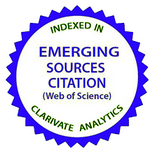Investigation of structural, electrokinetic and energy state properties of the semiconductive Zr1-xVxNiSn solid solution
DOI:
https://doi.org/10.15330/pcss.20.1.39Keywords:
solid solution, electrical conductivity, thermopower coefficient, Fermi levelAbstract
Structural, electrokinetic and energy state characteristics of the Zr1-xVxNiSn semiconductive solid solution (х=0–0.10) were investigated in the temperature interval 80–400 К. It was shown that doping of the ZrNiSn compound by V atoms (rV=0.134 nm) due to substitution of Zr (rZr=0.160 nm) results in increase of lattice parameter а(х) of Zr1-xVxNiSn indicating unforecast structural change. Based on analysis of the motion rate of the Fermi level ΔεF/Δх for Zr1-xVxNiSn in direction of the conduction band it was concluded about simultaneous generation of the structural defects of the donor and acceptor nature (donor-acceptor pairs) by unknown mechanism and creation of the corresponding energy levels in the band gap of the semiconductor.
References
[2] L. I. Anatychuk, Termoelements and Thermoelectric Devices (Kiev, Nauk. Dumka, 1979) [in Ukrainian].
[3] V. V. Romaka, P. Rogl, L. Romaka, Yu. Stadnyk, A. Grytsiv, O. Lakh, V. Krayovskyy, Intermetallics 35, 45 (2013) (doi.org/10.1016/j.intermet.2012.11.022).
[4] V. V. Romaka, L. P. Romaka, V. Ya. Krayovskyy, Yu. V. Stadnyk, Stannides of rare earths and transition metals (Lviv polytechnic university, Львів, 2015).
[5] L. P. Romaka, Yu. V. Stadnyk, V. A. Romaka, A. M. Goryn, V. Ya. Krayovskyy, Physics and Chemistry of Solid State, 19(1), 21 (2018) (doi: 10.15330/pcss.19.1.21-28).
[6] L. P. Romaka, Yu. V. Stadnyk, V. V. Romaka, P. Rogl, V. A. Romaka, A. M. Horyn, Physics and Chemistry of Solid State, 19(2), 151 (2018) (doi: 10.15330/pcss.19.2.151-158).
[7] V. A. Romaka, P. Rogl, L. P. Romaka, Yu. V. Stadnyk, V. Ya. Krayovskyy, D. Kacharovskii, A. M. Goryn, Journal of Thermoelectricity, 3, 24 (2016).
[8] L. P. Romaka, Yu. V. Stadnyk, V. A. Romaka, A. M. Goryn, P. Rogl, V. Ya. Krayovskyy, Z. M. Rykavets, Physics and Chemistry of Solid State, 18(1), 41 (2017) (doi: 10.15330/pcss.18.1.41-48).
[9] B. I. Shklovskii and A. L. Efros, Electronic Properties of Doped Semiconductors (Springer, NY, 1984).
[10] T. Roisnel, J. Rodriguez-Carvajal, Mater. Sci. Forum, Proc. EPDIC7, 378-381, 118 (2001).
[11] N. F. Mott, E. A. Davis, Electron processes in non-crystalline materials (Clarendon Press, Oxford, 1979).









